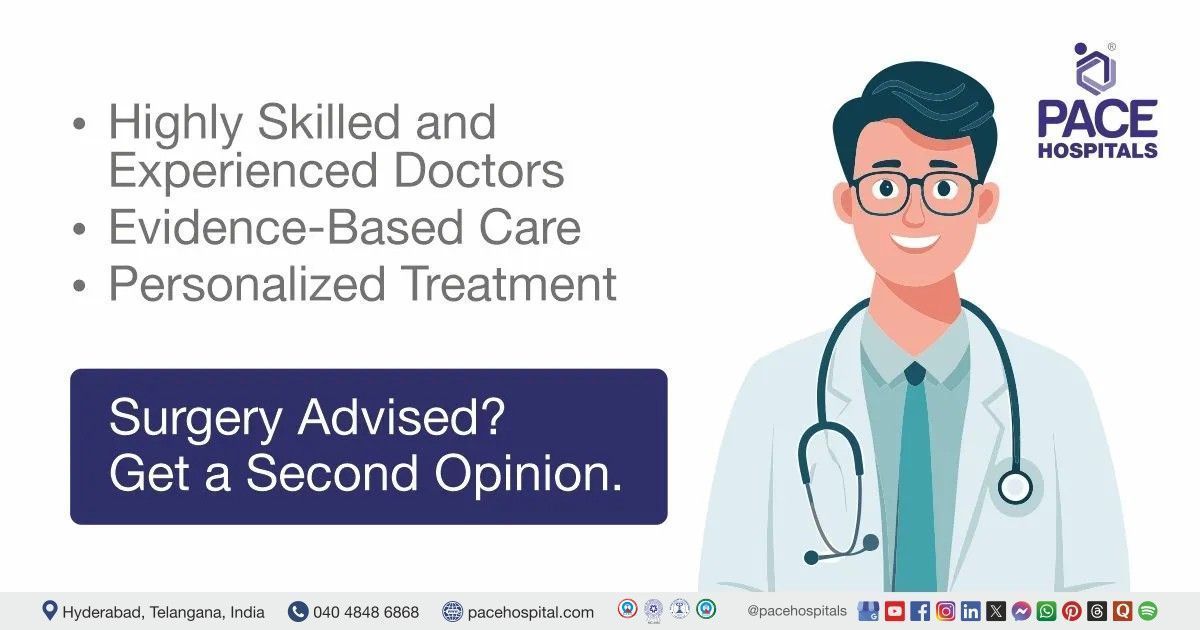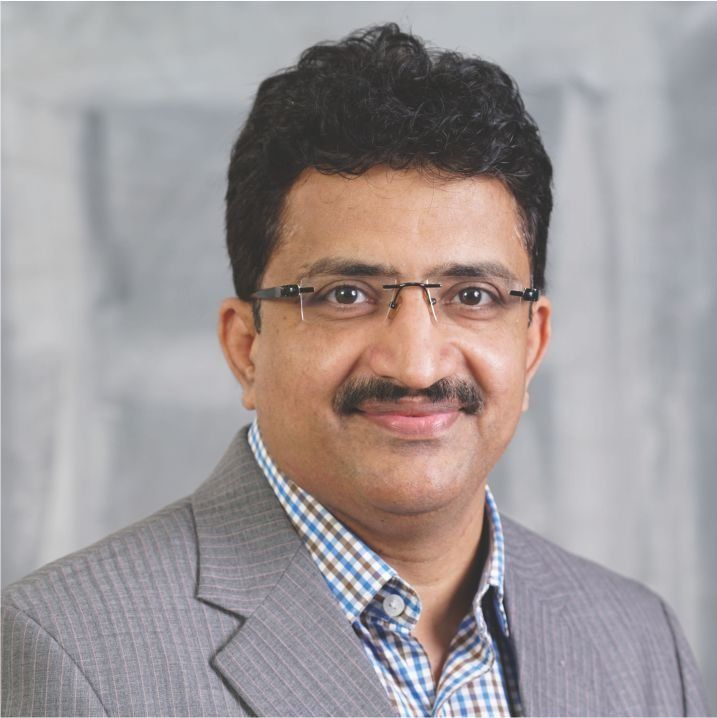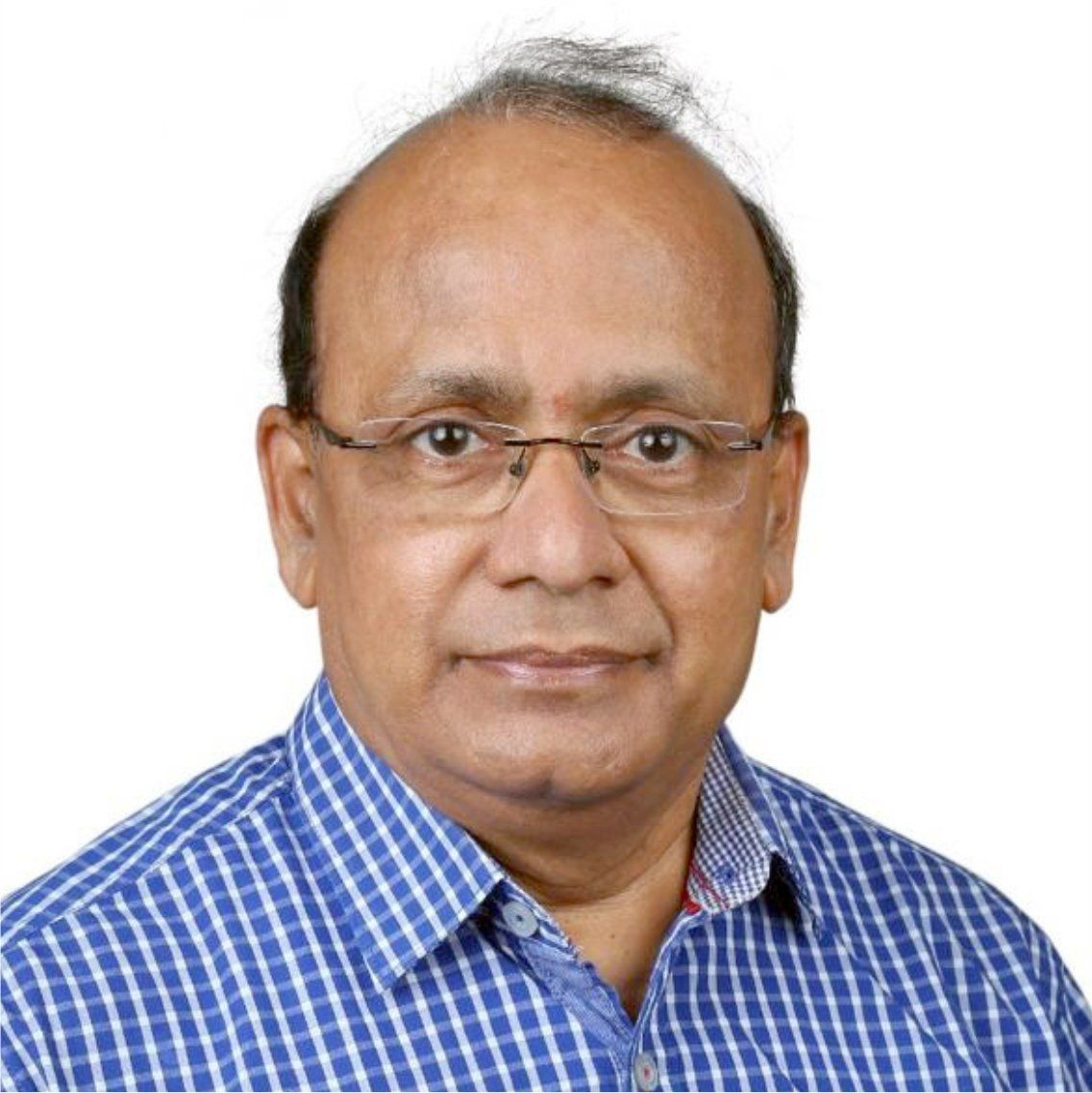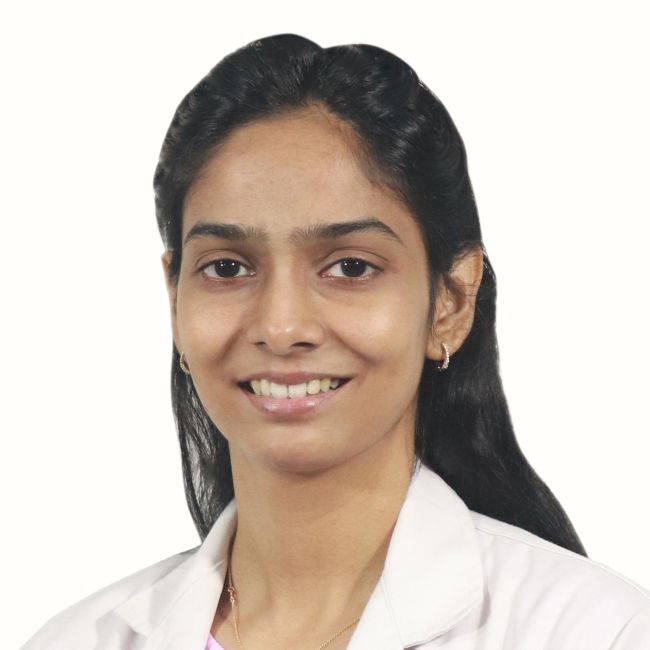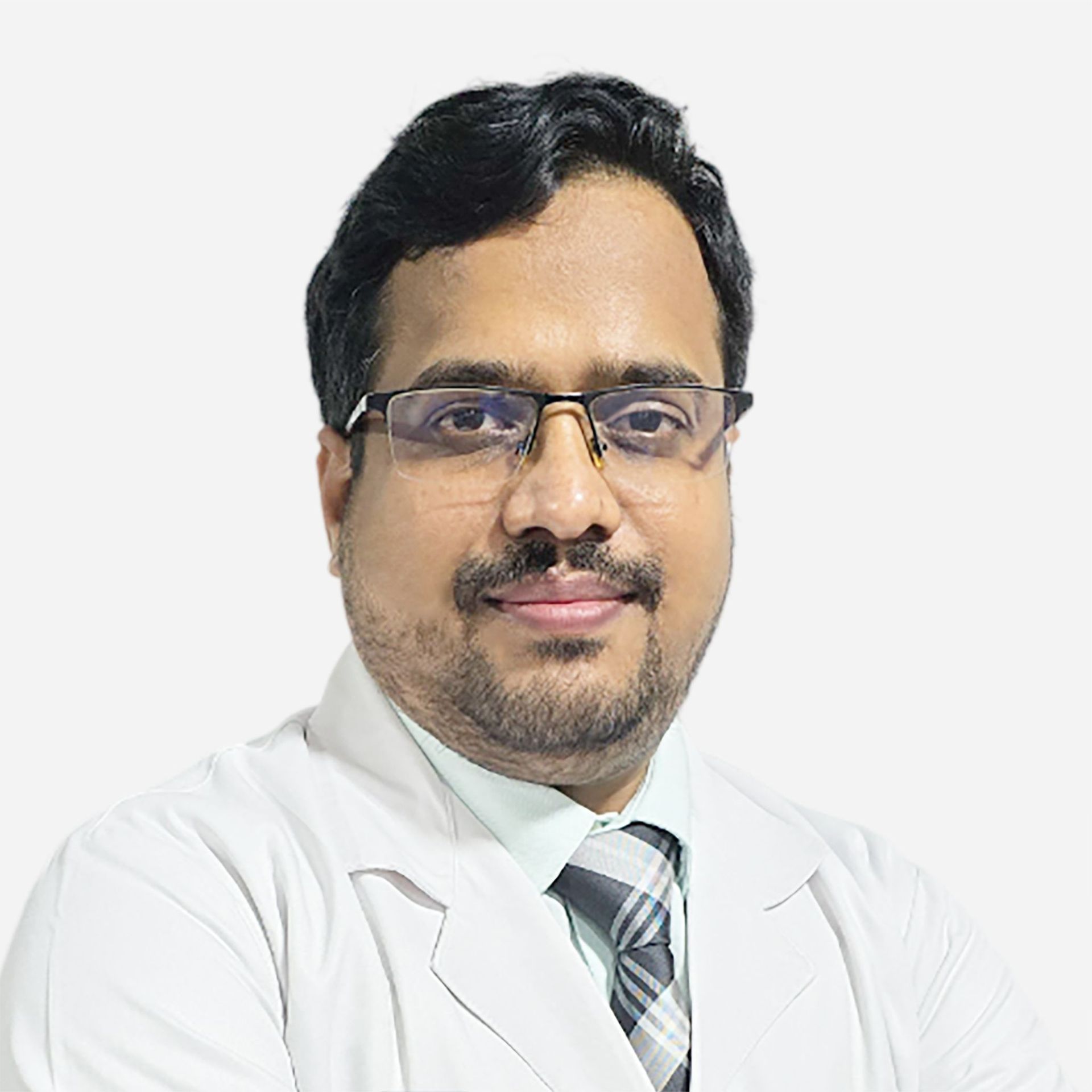Best Endoscopy Doctor in Hyderabad for Advanced GI Diagnostic Tests
PACE Hospitals
✅ Recommended by 9,452 Happy Patients. Get hassle-free appointments with Endoscopy Specialists.
Dr. Govind Verma
MD, DM (Gastroenterology), Fellowship in EUS
Experience : 30+ years
Interventional Gastroenterologist & Hepatologist
Specialist
Functional and Motility Disorders: Constipation and fecal incontinence, Gastroparesis, Functional abdominal pain, Hirschsprung’s disease, Diffuse esophageal spasm
Esophagus Disorders: Acid reflux / GERD (Gastroesophageal Reflux Disease), Achalasia cardia, Esophagitis, Esophageal varices, Barrett's esophagus, Esophageal cancer
Stomach Disorders: Gastritis, Peptic ulcers, Stomach cancer, H. pylori infection, Functional dyspepsia
Small and Large Intestine Disorders: Irritable Bowel Syndrome (IBS), Inflammatory Bowel Disease (IBD) (Ulcerative colitis, Crohn’s disease), Celiac disease, Intestinal infections, Colorectal cancer, Diverticulitis, Intestinal obstruction, Constipation and chronic diarrhea, Gas and bloating
Rectal and Anal Conditions: Hemorrhoids (Piles), Anal fissures, Anal fistulas, Rectal bleeding, Proctitis
Liver Diseases: Hepatitis A, B, C, E; Fatty liver disease (NAFLD/NASH), Liver cirrhosis, Liver cancer (Hepatocellular carcinoma), Autoimmune hepatitis, Wilson’s disease, Hemochromatosis
Gallbladder and Bile Duct Disorders: Gallstones, Cholecystitis, Bile duct obstruction, Cholangiocarcinoma (bile duct cancer), Primary sclerosing cholangitis (PSC)
Pancreatic Diseases: Acute and chronic pancreatitis, Pancreatic pseudocysts, Pancreatic cancer, Exocrine pancreatic insufficiency
Expertise
Endoscopy (Upper GI, Colonoscopy, Sigmoidoscopy), Capsule endoscopy
Endoscopic Retrograde Cholangiopancreatography (ERCP)
Polypectomy, Biopsies of the GI tract, PEG tube insertion
Endoscopic Ultrasound (EUS) and EUS-Guided Interventions: EUS-guided biopsies, EUS-guided pancreatic pseudocyst drainage, Biliary and pancreatic duct stenting
Third-Space Interventional Endoscopy: POEM (Peroral Endoscopic Myotomy), ARMS (Antireflux Mucosal Resection), GERD-X procedure for reflux disease
Advanced Endoscopic Bariatric and Oncology Procedures: Endoscopic Sleeve Gastroplasty (ESG), Endoscopic Submucosal Dissection (ESD), Endoscopic Mucosal Resection (EMR)
Comprehensive Hepato-Biliary and Pancreatic Interventions
Consultation Details
Languages Spoken: English, Hindi, Telugu, Marathi
Timing: Mon to Sat - 10 AM to 6 PM
Location: PACE Hospitals, HITEC City & Madinaguda
Dr. M Sudhir
MBBS, MD (Internal Medicine), DNB (Internal Medicine), DNB (Gastroenterology), FICP
Experience : 40+ years
Sr. Gastroenterologist and Hepatologist (Liver Specialist)
Specialist
- Inflammatory Bowel Diseases (IBD): Ulcerative colitis, Crohn’s disease
- Gastrointestinal Motility Disorders: Achalasia cardia, Hirschsprung’s disease, Diffuse esophageal spasm
- Pancreatico-Biliary Disorders: Acute and chronic pancreatitis, Pancreatic pseudocysts, Common bile duct (CBD) stones, Gallstones, Biliary and pancreatic malignancies
- Functional Bowel Disorders: Constipation, Irritable Bowel Syndrome (IBS), Gastroparesis, Functional abdominal pain
- Liver Diseases: Chronic liver disease, Hepatitis, Cirrhosis and liver-related complications
Expertise
- Diagnostic Procedures: Endoscopy (Upper GI, Colonoscopy, Sigmoidoscopy), Capsule endoscopy, ERCP (Endoscopic Retrograde Cholangiopancreatography)
- Advanced and Therapeutic Endoscopy: Third-Space Endoscopy Techniques, POEM (Peroral Endoscopic Myotomy) for achalasia, Endoscopic Sleeve Gastroplasty (ESG) for obesity, Endoscopic Ultrasound (EUS) for pancreatic, biliary, and GI evaluation
Consultation Details
Languages Spoken: English, Hindi, Telugu
Timing: Mon to Sat - 9 AM to 1 PM
Location: PACE Hospitals, HITEC City
Dr. Padma Priya
MBBS, MD (Internal Medicine), DrNB (Medical Gastroenterology)
Experience : 9+ years
Consultant Gastroenterologist and Hepatologist
Specialist
Specialist in gastrointestinal (GI), pancreatic and hepatic diseases such as gastroesophageal reflux disease (GERD), anal and rectal disorders such as piles (hemorrhoids), anal fissures and anal fistulas, Inflammatory bowel disease (Ulcerative colitis and Crohn’s disease), Inflammatory bowel Syndrome, Peptic ulcers, Celiac disease, GI infections, Gallbladder stones, Biliary tract disorders, Liver diseases, Pancreatic disorders, Gastrointestinal bleeding, Diverticulitis, Eosinophilic Gastroenteritis, Gastrointestinal motility, Gastrointestinal cancer, Malabsorption Syndromes etc.
Expertise
ERCP, EUS, Colonoscopy, Sigmoidoscopy, Capsule endoscopy, Endoscopic mucosal resection, Endoscopic ultrasound-Fine needle aspiration / Fine needle biopsy, Polypectomy, Esophagogastroduodenoscopy (EGD), Endoscopic ultrasound (EUS)-guided, Cystogastrostomy, Spiral enteroscopy, Oesophageal manometry, Ano-rectal manometry, PEG tube insertion, Narrow-band imaging, Endoscopic variceal ligation, Argan plasma coagulation, Haemoclip deployment, NJ Tube placement, Oesophageal bougie dilation, Achalasia balloon dilation, Colonic stricture dilation, Pyloric balloon dilation, etc.
Consultation Details
Languages Spoken: English, Hindi, Telugu
Timing: Mon to Sat - 10 AM to 6 PM
Location: PACE Hospitals, HITEC City & Madinaguda
Dr. P Arun Kumar
MBBS, DNB (General Medicine), DM (Medical Gastroenterology)
Experience : 7+ years
Consultant Gastroenterologist and Hepatologist
Specialist
Dr. P Arun Kumar is recognized for his expertise in advanced diagnostic and therapeutic gastroenterology and hepatology procedures, offering comprehensive care for complex gastrointestinal and liver conditions.
- Upper GI Endoscopy
- Colonoscopy and Sigmoidoscopy
- Capsule Endoscopy
- Endoscopic Mucosal Resection (EMR)
- Polypectomy (Hot and Cold Snare)
- Endoscopic Variceal Ligation (EVL)
- Argon Plasma Coagulation (APC)
- Endoscopic Hemoclipping
- Esophageal and Colonic Dilatation
- CRE Balloon Dilatation
- Colonic Stricture Dilatation
- PEG and NJ Tube Placement
- Narrow Band Imaging (NBI)
- Diagnostic and Therapeutic Endoscopic Ultrasound (EUS)
- Pancreatico-biliary Endoscopic Interventions
- Esophageal and Anal Manometry
Expertise
With a strong focus on evidence-based and patient-centered care, Dr. P Arun Kumar specializes in diagnosing and managing a wide spectrum of gastrointestinal, liver, pancreatic, and functional bowel disorders.
- Gastroesophageal Reflux Disease (GERD)
- Dyspepsia and Reflux Disorders
- Peptic Ulcer Disease (Gastric & Duodenal Ulcers)
- H. Pylori–associated Gastritis
- Acute and Chronic Diarrhea
- Functional Bowel Disorders
- Irritable Bowel Syndrome (IBS)
- Chronic Constipation and GI Motility Disorders
- Neuro-gastroenterological Conditions
- Inflammatory Bowel Disease (Ulcerative Colitis & Crohn’s Disease)
- Celiac Disease and Malabsorption Syndromes
- Gastrointestinal Bleeding
- Esophageal Disorders, including Eosinophilic Esophagitis
- Esophageal Carcinoma
- Acute and Chronic Pancreatitis
- Biliary Tract Disorders
- Acute and Chronic Liver Diseases
- Viral Hepatitis (A, B, C, D & E)
- Metabolically Dysfunctional-Associated Steatotic Liver Disease (MASLD)
- Fatty Liver Disease and Alcohol-related Liver Disease
Consultation Details
Languages Spoken: English, Hindi, Telugu
Timing: Mon to Sat - 9 AM to 6 PM
Location: PACE Hospitals, HITEC City & Madinaguda
Top Endoscopy Specialists in Hyderabad for Comprehensive GI Endoscopy Test
PACE Hospitals is recognised for having the Top Endoscopy Specialists in Hyderabad, India, offering advanced diagnostic and therapeutic procedures with an emphasis on patient safety, comfort, and accurate results. Our experienced endoscopy specialist doctors provide comprehensive care for a wide range of gastrointestinal and non-gastrointestinal conditions, ensuring world-class standards at every step.
Our team of endoscopy experts uses advanced diagnostic tools, including high-definition endoscopes, imaging guidance, and minimally invasive techniques. With these resources, the best doctor for endoscopy in Hyderabad ensures thorough evaluations, early detection of abnormalities, and accurate treatment planning.
Treatment services at PACE Hospitals include diagnostic endoscopy and therapeutic procedures such as polyp removal, stricture dilatation, stent placement, and biopsy. Each case is handled with precision by the leading Endoscopies Doctors in Hyderabad, who work closely with patients to provide safe and effective care tailored to individual needs.
Known for clinical excellence and compassionate care, PACE Hospitals is home to the
Best Endoscopy doctor in Hyderabad, India. From consultation and evaluation to treatment and follow-up, we ensure complete coordination, timely procedures, and long-term support for better health outcomes.
Frequently Asked Questions (FAQs) on Endoscopy
Is endoscopy painful?
Endoscopy is generally not painful, though it may cause some mild discomfort depending on the type of procedure. Most are performed using local anesthesia, sedation, or occasionally general anesthesia to keep the patient relaxed. During the procedure, mild pressure, bloating, or gagging sensation may be felt, especially in upper gastrointestinal endoscopy. These sensations are usually brief and well-managed by the medical team. After the procedure, slight soreness or bloating may occur, but significant pain is rare. Overall, the procedure is well-tolerated and safe for most patients. For better care, many consult the best endoscopy doctor in Hyderabad, India.
What diseases can be detected by an endoscopy?
Endoscopy helps detect various diseases depending on the area examined. It can recognise ulcers, gastritis, GERD, and celiac disease in the digestive tract. It also detects tumors, cancers, and polyps in organs like the stomach, colon, and lungs. Conditions like Crohn’s disease, ulcerative colitis, and infections can also be diagnosed. Endoscopy is useful for finding internal bleeding, stones, or structural issues. It is also used to take biopsies and monitor chronic conditions. These are often identified with the guidance of a trusted endoscopy doctor.
Who is the best endoscopy doctor in hyderabad?
At PACE Hospitals, endoscopic procedures are performed by the best endoscopy doctors in Hyderabad, including Dr Govind Verma, Dr M. Sudhir, and Dr Padma Priya. They perform diagnostic and therapeutic endoscopy to identify the cause of digestive symptoms such as acidity, abdominal pain, bleeding and swallowing difficulties, and guide patients with appropriate treatment based on the findings. Their focus is on safe procedures, clear explanation of results and timely care for better digestive health.
How is endoscopy done?
Endoscopy is done using a thin, flexible tube known as an endoscope, which has a light and a camera at the tip. The procedure depends on the part of the body being examined. For example, in a gastrointestinal endoscopy, the endoscope is softly inserted through the mouth or anus. In procedures like laparoscopy, small cuts are made in the skin to insert the scope. The patient is usually given local anesthesia, sedation, or sometimes general anesthesia to stay comfortable. The doctor views the images on a screen and may take tissue samples (biopsies) or perform minor treatments during the procedure. Many rely on the best doctor for endoscopy in Hyderabad, India for such procedures.
How long does an endoscopy take?
A typical endoscopy lasts from 15 to 45 minutes, depending on the procedure's type and goal. The average duration of an upper gastrointestinal endoscopy is 15 to 30 minutes, whereas a colonoscopy may take 30 to 45 minutes. It can take up to one or two hours for more complicated operations like laparoscopy. Preparation prior to the surgery and recovery following it also require more time, particularly if sedation or anesthesia is utilized to ensure the patient's comfort. Such procedures are usually managed by a good endoscopy doctor.
Is endoscopy dangerous?
Endoscopy is generally a safe procedure with a low risk of complications. It involves inserting a flexible tube with a camera into the digestive tract to examine internal organs. While most patients tolerate it well, some may have mild side effects like infection, throat discomfort, bloating, or cramping post procedure. Serious complications like bleeding or perforation are rare but can occur, especially if a biopsy or treatment is performed during the endoscopy. Overall, when conducted by experienced gastroenterologists, endoscopy is considered a safe and valuable diagnostic tool. For added reassurance, consulting an endoscopy specialist is recommended.
How long does it take to recover from an endoscopy?
Recovery after an endoscopy is generally quick and uncomplicated. Most patients begin to feel normal within 1 to 2 hours post procedure, although mild symptoms such as drowsiness from sedation, bloating, or a sore throat may persist for a few hours. General activities can usually be resumed the next day, but driving needs to be avoided on the day of the procedure if sedation was used. In some cases, where more complex procedures are performed, such as biopsies, dilation, or polyp removal, recovery may take up to 24 to 48 hours, depending on the individual. If no sedation was administered, patients can often eat, drink, and return to daily activities after procedure. It is important to follow instructions after the procedure carefully to ensure a safe and complete recovery. Such care is often managed at the top endoscopy doctor in Hyderabad, India at PACE Hospitals.
What is endoscopy?
Endoscopy is a medical procedure used to view the inside of the body using a thin, flexible tube known as an endoscope, which has a light and a camera. It helps diagnose and sometimes treat various conditions. Different types of endoscopies include
arthroscopy (joints),
bronchoscopy (lungs), colonoscopy and sigmoidoscopy (large intestine), cystoscopy and ureteroscopy (urinary system), laparoscopy (abdomen or pelvis), and upper gastrointestinal endoscopy (esophagus, stomach, and upper digestive tract). It is minimally invasive and may be done under local or general anesthesia. This procedure is usually performed by an
endoscopy specialist doctor.
Does endoscopy detect cancer?
Endoscopy is an essential diagnostic procedure that can detect cancer by allowing direct visualization of the internal lining of organs such as the esophagus, stomach, and colon. During the procedure, the gastroenterologist can identify suspicious areas like abnormal growths, ulcers, or lesions. If any such abnormalities are observed, a biopsy can be performed to collect tissue samples for further pathological examination to confirm the presence of cancer cells. Therefore, endoscopy plays a key role in the early detection and diagnosis of cancers within the gastrointestinal tract. This is often carried out by the
best endoscopy specialist in Hyderabad, India.
Can I drink water before endoscopy?
It is generally recommended to avoid drinking or eating anything for at least 6 to 8 hours before an upper endoscopy to ensure that the stomach is empty, which helps minimise the risk of complications such as aspiration during the procedure. In some cases, small sips of water may be allowed up to 2 hours before the test, especially if it is needed to take essential medications. It is essential to follow the specific instructions provided by the healthcare provider, as guidelines can vary depending on the type of endoscopy and the patients’ health condition. Always confirm the preparation requirements prior to the procedure. Guidance is often given by a
trusted endoscopy doctor.
What is capsule endoscopy?
Capsule endoscopy is a non-invasive diagnostic procedure used to examine the lining of the small intestine through a tiny, pill-sized camera. The capsule is swallowed and contains a light source, camera, and transmitter. As it moves through the digestive tract, it captures thousands of images, which are transmitted to a recorder worn by the patient. These images help detect conditions such as bleeding,
Crohn’s disease, tumors, or ulcers in areas not easily reached by traditional endoscopy. The capsule is typically passed naturally in the stool within 24–48 hours. This procedure is often advised by the
best endoscopy doctor in Hyderabad, India.
When endoscopy is required?
Endoscopy is usually required when there are persistent symptoms related to the upper digestive tract. These may include difficulty swallowing, chronic heartburn or acid reflux, unexplained chest or abdominal pain, ongoing nausea or vomiting, gastrointestinal bleeding, or significant weight loss. It is also suggested for further evaluation of abnormalities found on
imaging tests or to monitor known conditions such as ulcers or
Barrett's esophagus. Additionally, endoscopy can be used to take biopsies, remove growths, or perform therapeutic interventions as needed. In such cases, patients often consult the
top endoscopy specialists in Hyderabad, India.
What to eat after an endoscopy?
After an endoscopy, it is suggested to begin with a light and easily digestible diet to avoid irritating the digestive tract. Clear fluids like water, broth, or herbal tea are advised to take initially. Soft foods like mashed potatoes, yogurt, bananas, soup, or plain rice can be given as tolerated. Spicy, hot, acidic, or hard-to-digest foods need to be avoided for at least 24 hours, particularly if a biopsy was taken or sedation was used. Specific dietary guidelines need to follow as advised by the healthcare provider. These are usually recommended by the
best doctor for endoscopy.
Is colonoscopy and endoscopy the same?
Colonoscopy and endoscopy are not the same, though both are used to examine the digestive tract. A colonoscopy checks the colon and rectum using a tube inserted through the anus, often to detect polyps, cancer, or inflammation. An endoscopy, usually referring to an upper endoscopy, examines the esophagus, stomach, and duodenum through a tube passed down the throat. It helps diagnose issues like ulcers, acid reflux, or bleeding. While both use a camera on a flexible tube, they explore different parts of the gastrointestinal system. The choice depends on the patient’s symptoms and the area that needs examination. Such differences are often explained by a
famous endoscopy doctor in Hyderabad at PACE Hospitals.
What does chest pain after endoscopy mean?
Chest pain after an endoscopy can happen for various reasons, from mild to serious. Often, it is caused by air being introduced during the endoscopy, resulting in temporary pressure or discomfort. Irritation of the esophagus or throat may also lead to mild soreness. In rare cases, chest pain could signal a serious complication like an esophageal tear, particularly if it's sharp or persistent. It may also be unrelated to the procedure, such as heart-related pain occurring at the same time. If chest pain is severe, long-lasting, or comes with symptoms like fever or trouble swallowing, medical help needs to be sought immediately. Most mild discomfort goes away on its own. Such cases are usually managed by the top endoscopy specialist in Hyderabad, India at PACE Hospitals.
Are endoscopy and colonoscopy done at the same time?
Endoscopy and colonoscopy can be done at the same time, especially if a patient has symptoms affecting both the upper and lower parts of the digestive system. This combined procedure allows the doctor to examine the esophagus, stomach, and duodenum through the upper endoscopy, and the colon and rectum through the colonoscopy. Performing both tests together is efficient, as it requires only one preparation and one session of sedation, reducing overall discomfort and saving time. It also helps in making a quicker and more accurate diagnosis if multiple gastrointestinal issues are suspected. These procedures are generally done by the best doctor for endoscopy.
Can endoscopy detect stomach cancer?
Yes, endoscopy can detect stomach cancer. During an upper endoscopy, a doctor inserts a thin, flexible tube with a camera (endoscope) through the mouth to examine the esophagus, stomach, and the beginning of the small intestine. If any abnormal areas, such as ulcers, lumps, or suspicious growths, are seen in the stomach lining, the doctor can take biopsies (small tissue samples) for laboratory analysis. These biopsies help confirm whether the cells are cancerous. Endoscopy is one of the most effective tools for detecting
stomach cancer early, especially when symptoms like persistent stomach pain, weight loss, or vomiting blood are present. Many patients seek care from the
best endoscopy doctor in Hyderabad, India.
How is capsule endoscopy removed?
Capsule endoscopy is different from traditional endoscopy because it doesn’t need to be removed. The patient swallows a small, pill-sized camera that travels naturally through the digestive tract, taking thousands of pictures along the way. After that, the capsule passes out of the body through a bowel movement, usually within 24 to 48 hours. There’s no need for retrieval or removal by a doctor. Follow-ups are often monitored by an
endoscopy specialist doctor.
Is nasal endoscopy painful?
Nasal endoscopy is usually not painful, but it can cause some mild discomfort. During the procedure, a thin, flexible tube along with a camera is gently inserted through the nose to examine the nasal passages and sinuses. It might feel a slight pressure, tickling, or a bit of irritation, but local anaesthesia or a numbing spray is often used to minimize any discomfort. Most people tolerate it well, and the procedure is quick, usually lasting just a few minutes. This is generally performed by a
trusted endoscopy doctor.
What does endoscopy biopsy detect?
An endoscopy biopsy is used to detect a range of conditions affecting the digestive tract. During the procedure, a small tissue sample is taken and examined under a microscope to help diagnose issues such as cancer (including stomach, esophageal, or
intestinal cancer), inflammation (like gastritis or esophagitis), infections such as H. pylori, and autoimmune disorders like celiac disease. It can also help identify ulcers, abnormal growths, or tumors. This analysis allows doctors to confirm or rule out specific conditions and determine the most appropriate treatment plan. Such cases are usually handled by
endoscopies doctors in Hyderabad, India.
What are the advantages of capsule endoscopy?
Capsule endoscopy is painless and non-invasive procedure where a small, camera-equipped capsule is swallowed to examine the digestive tract. It offers a more comfortable alternative to traditional endoscopy, with no need for sedation or insertion of tubes. This procedure gives clear, detailed images, especially in the small intestine, which is difficult to reach with standard techniques. It is highly effective in identifying issues like bleeding, tumors, or Crohn's disease and inflammation. Patients can go about most of their normal activities during the test. There is no recovery time needed, making it a convenient and patient-friendly option. These benefits are often guided by a
good endoscopy doctor.
What is sleep endoscopy?
Sleep endoscopy( Drug-Induced Sleep Endoscopy (DISE)) is a procedure used to examine the airway of patients with sleep disorders, especially obstructive sleep apnea (OSA). During the test, the patient is given mild sedation to mimic natural sleep, and a thin, flexible camera (endoscope) is inserted through the nose to observe how the airway behaves while sleeping. This helps doctors identify the exact site and cause of the airway blockage, such as the tongue, soft palate, or other throat structures collapsing. Sleep endoscopy is especially useful for customizing treatment plans, including CPAP, oral devices, or surgical options, based on the individual’s specific airway anatomy. These are usually done by a
top endoscopy doctors in Hyderabad at PACE Hospitals.
What happens if you drink water before an endoscopy?
Drinking water before an endoscopy appointment can interfere with the procedure. Most doctors advise stopping all liquids, including water, at least 2 to 4 hours before the procedure. Drinking water can increase the risk of aspiration, which is when stomach contents accidentally enter the lungs during sedation. This can result in serious complications like pneumonia. Additionally, a full stomach can make it harder for the doctor to get clear views and may delay or cancel the procedure. Always follow the doctor's fasting instructions carefully. These instructions are usually provided by the best doctor for endoscopy test.
Can endoscopy be done during pregnancy?
Endoscopy can be done during pregnancy if it's medically necessary, but it's usually avoided unless the benefits outweigh the risks. When needed, doctors take extra precautions to protect both the mother and baby, such as using the lowest effective sedation and carefully monitoring vital signs. Upper endoscopy (examining the esophagus and stomach) is considered safer than colonoscopy during pregnancy. If an endoscopy is needed, it's generally done in the second trimester when the risk to the fetus is lower. Always discuss the risks and benefits with a healthcare provider before proceeding. Such cases are best managed by the best endoscopy specialist in Hyderabad, India.
What happens if you cough during an endoscopy?
Coughing during an endoscopy is usually a natural reflex because the scope can irritate the throat or airway. Coughing may cause some temporary discomfort or make it a bit harder for the doctor to advance the scope smoothly, but it's generally not harmful. Doctors often use numbing sprays or mild sedation to help reduce gagging and coughing. If coughing becomes too strong or persistent, the doctor may pause the procedure briefly to let the patient relax before continuing. It’s important to try to stay as calm and relaxed as possible during the exam. Such advice is generally given by a trusted endoscopy doctor.
How often should you get an endoscopy?
The frequency of undergoing an endoscopy depends on the medical condition and the doctor's recommendations. For individuals with certain risk factors such as a history of ulcers, Barrett's esophagus, unexplained digestive symptoms, or gastrointestinal bleeding endoscopies may be advised regularly, sometimes every few years. For those without symptoms or risk factors, routine endoscopy is generally not needed. The healthcare provider will decide the appropriate timing based on the symptoms, diagnosis, and overall health. It is important to follow the doctor's guidance on when and how frequently to have this procedure. Many patients consult the best endoscopy doctor in Hyderabad, India at PACE Hospitals for ongoing care.
What our patients have to say
Why choose PACE Hospitals?
- A Multi-Super Speciality Hospital.
- NABH, NABL, NBE & NABH - Nursing Excellence accreditation.
- State-of-the-art Liver and Kidney transplant centre.
- Empanelled with all TPAs for smooth cashless benefits.
- Centralized HIMS (Hospital Information System).
- Computerized health records available via website.
- Minimum waiting time for Inpatient and Outpatient.
- Round-the-clock guidance from highly qualified super specialist doctors, surgeons and physicians.
- Standardization of ethical medical care.
- 24X7 Outpatient & Inpatient Pharmacy Services.
- State-of-the-art operation theaters.
- Intensive Care Units (Surgical and Medical) with ISO-9001 accreditation.
Share on
Request an appointment
Fill in the appointment form or call us instantly to book a confirmed appointment with our super specialist at 04048486868
Appointment request - health articles
Recent Articles


